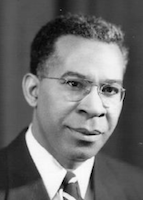Oliver Cox | |
|---|---|
 | |
| Born | August 24, 1901 Port of Spain, Trinidad |
| Died | September 4, 1974 |
| Nationality | Trinidadian-American |
| Education | Central YMCA High School Chicago
Lewis Institute Northwestern University Law (1928) U. Chicago Department of Economics M.A.(1932) U. Chicago Department of Sociology Ph.D. (1938) [1] |
| Notable work | Caste, Class, and Race: A Study in Social Dynamics, 1948
Foundations of Capitalism, 1959 Capitalism as a System, 1964 Race Relations: Elements and Social Dynamics, 1976 |
Oliver Cromwell Cox (24 August 1901 – 4 September 1974) was a Trinidadian-American sociologist. Cox was born into a middle-class family in Port of Spain, Trinidad and emigrated to the United States in 1919.[citation needed]
Cox was often misconceived as a Marxist due to his focus on class conflict and capitalism; however, Cox fundamentally disagreed with Marx's analysis of capitalism. One of Cox's points of contention with Marx was to argue that foreign trade, and not commodity production for the private accumulation of capital, was the primary driving force in capitalist development.[2]
Cox was a founder of the world-systems perspective, which posits a socioeconomic system that encompasses part or all of the world.[3] Additionally, Cox was an important scholar of racism and its relationship to the development and spread of global capitalism, and a member of the Chicago School of Sociology.[4] In 1929 he developed poliomyelitis (polio), causing both his legs to be permanently crippled and that was when he gave up his plans to study law. He was the son of William Raphael Cox and Virginia Blake Cox.
- ^ Herbert M. Hunter
- ^ Watson, Hilbourne A. (2014). "Oliver Cromwell Cox's understanding of capitalism and the problem of his materialist perspective". Canadian Journal of Latin American and Caribbean Studies / Revue canadienne des études latino-américaines et caraïbes. 39 (3): 382–402. doi:10.1080/08263663.2014.1013287. ISSN 0826-3663. JSTOR 26588039. S2CID 142941993.
- ^ Wallerstein, Immanuel (2000). "Oliver C. Cox As World-Systems Analyst". Research in Race and Ethnic Relations. 11: 173–183.
- ^ Cheseboro, Anthony (1998). "Conflict and Continuity: E. Franklin Frazier, Oliver C. Cox and the Chicago School of Sociology". Journal of the Illinois State Historical Society. 92 (2): 150–172.
